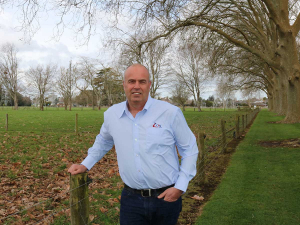Green no more?
OPINION: Your old mate has long dismissed the Greens as wooden bicycle enthusiasts with their heads in the clouds, but it looks like the ‘new Greens’ may actually be hard-nosed pragmatists when it comes to following voters.
 CRV managing director James Smallwood says genetics has been identified as a means of building a long-term solution to climate change.
CRV managing director James Smallwood says genetics has been identified as a means of building a long-term solution to climate change.
Genetics will play a key role in helping dairy farmers meet climate targets at a herd level, while maintaining the highest quality milk production, says CRV managing director James Smallwood.
His comments come following the release of the Climate Change Commission's final report, which sets out a plan for New Zealand to reduce its emissions and become carbon neutral by 2050.
"Genetics has been identified as a means of building a long-term solution to climate change," says Smallwood.
"As an industry, if cow numbers are reduced farmers will need to improve efficiency per cow to ensure farming remains sustainable, both environmentally and economically.
"With technologies such as genomic testing, we can work with farmers to identify superior animals in their herds.
By combining this technology with precision breeding tools, such as sexed semen from elite bulls, farmers have an opportunity to accelerate their herd's genetic gain in animal efficiency."
Access to quality data is crucial for making smart herd management and breeding decisions.
Farmers can use the data captured on farm from herd testing, DNA testing and herd recording to identify the elite animals that possess traits they want in future dairy herds.
Herd management tools like CRV's myHERD mean all this data can be captured in one place and used to help breed efficient, more sustainable cows, says Smallwood.
He believes meeting the targets recommended in the report will be a big job for both farmers and industry and says they will need support and access to new tools in order to achieve them.
"The industry requires ongoing investment in research, such as the current methane genetic trials. Farmers need tools to be able to accurately measure, report and reduce the environmental footprint of their herd."
CRV's grass-fed genetics breeding programme in New Zealand, combined with the company's global presence and years of investment overseas and locally, means the company is well-positioned to help develop tools and solutions, he says.
CRV Netherlands has been investing in individual feed intake collection for several years and is making excellent progress in terms of giving farmers real tools to breed a herd that produces more milk with less feed.
"Consumers are demanding more information about the provenance of their food. From greenhouse gas emissions and carbon footprint to animal welfare, the spotlight is on New Zealand as a food producing nation.
"CRV has led the way in developing genetic solutions for breeding animals that are polled (hornless) and more tolerant to facial eczema and more efficient. We were also first to market with our sexed semen offering, which enables farmers to breed heifers from their best cows.
"There is no doubt these new targets are challenging, but they also present our dairy industry with an opportunity to step up and further strengthen our global competitive advantage. CRV is committed to working with farmers to do just that," says Smallwood.
Tickets are now available for Beef + Lamb New Zealand’s (B+LNZ) Out the Gate, returning from 19-21 May 2026 at Te Pae, Christchurch.
Dairy Women's Network (DWN) is welcoming AgriHealth as a new partner.
Northland Field Days patron Ross Newlove remembers the inaugural field days he attended 40 years ago.
Southland farmer Murray Donald has been appointed as chair of Safer Farms, the industry-led organisation focused on reducing harm, injuries and fatalities in the agricultural sector.
National Lamb Day returns this Sunday, 15 February, with Beef + Lamb New Zealand Inc calling on Kiwis to fire up their barbecues and celebrate the people and the product that put New Zealand on the world map.
When it comes to arranging the sound system at Northland Field Days, no one does it better than Colin Finlayson.
OPINION: Fonterra may be on the verge of selling its consumer business in New Zealand, but the co-operative is not…
OPINION: What does the birth rate in China have to do with stock trading? Just ask a2 Milk Company.